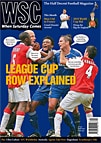 In the dying days of George Graham’s Arsenal reign, the Scot signed a player as far from his own image as imaginable. Jon Spurling remembers a Dutch enigma
In the dying days of George Graham’s Arsenal reign, the Scot signed a player as far from his own image as imaginable. Jon Spurling remembers a Dutch enigma
As fortysomethings waxed lyrical about Geordie Armstrong’s “magnificent engine” and Brian Marwood was voted the club’s greatest ever short-term acquisition, debate raged among Arsenal fans on a website over who was the club’s greatest recent wide player. Anders Limpar – rather harshly – was described as a “poor man’s Robert Pires”. So what, I wondered, did that make Glenn Helder. A destitute’s Marc Overmars, perhaps?
Helder’s arrival at Highbury in February 1995, as the George Graham era spluttered to its tortuous, scandal-ridden conclusion, was remarkable partly because the Dutch winger was the total antithesis of the ideal Graham “type”. Clad in a dodgy designer suit and sporting long hair (Graham had hated Charlie Nicholas’s) and an earring for the unveiling press conference, Helder had a reputation within Dutch football as being more “mercurial” than the spectacularly flaky Nottingham Forest winger Bryan Roy.
Graham, who had spent so long pleading poverty, had recently indulged in a huge spending spree. Helder’s capture from Vitesse Arnhem for £2.3 million, together with the £3.6m combined blown on Chris Kiwomya and John Hartson, meant George had spent more in two weeks than in three years. Various conspiracy theories circulated as to why George was so gung-ho at the end of his tenure; despite numerous stories predicting his imminent departure, he claimed Helder “would be part of my ongoing rebuilding programme”. When Graham was fired a week later, everyone asked why the board had allowed the Scot to spend so much if they planned to dismiss him. The directors’ silence was deafening.
With Graham going that day, Helder admitted to “a sense of unease” before his debut, at home to Forest. But with Arsenal ravaged by injuries and Stewart Houston staking a claim for the top job, fans were not only “walking in Kiwomya wonderland” for that one night (the former Ipswich man scored the only goal), they also marvelled at “Lionel Richie on the wing”, as Helder bewitched Steve Chettle with a Ronaldinho-style double shuffle. To cries of “Olé”, he pulled it off once more, before, in a sign of things to come, falling on his arse at the third attempt. But Martin Tyler was moved to describe Helder’s bow as “the finest home debut I can remember for a long time”.
With the Gunners in a relegation dogfight, Helder’s form fluctuated wildly. Aside from odd glimpses of searing pace, he frequently looked out of his depth and gained a reputation in the dressing room for “having a bloody big gob on him, especially about money” as David Seaman said. Tony Adams and Steve Bould, after discovering that Helder was earning substantially more than several established first‑teamers, decided to rough him up in training to see if he was anything other than “a one-trick shuffle pony”. He wasn’t. When Bruce Rioch marched into the club in June, he ordered Helder to get his hair cut. The Dutchman obediently shaved his head – no more Lionel Richie chants – and, Samson‑like, his powers waned further.
Some even opposed buying Dennis Bergkamp that summer on the grounds that Arsenal could do without another maverick Dutchman. Despite setting up Bergkamp’s first Arsenal goal against Southampton and Patrick Kluivert’s second for Holland in a Euro 96 play-off against the Republic of Ireland in late 1995, Helder rapidly slid into obscurity. Omitted from Holland’s 22 for the finals and despatched ruthlessly by Arsène Wenger, Helder fled to China, played for cash-strapped Benfica – who deferred his wages – and then disappeared to Hungary. There were alarming tales of blown fortunes, mounting gambling debts and a failed suicide bid. He eventually returned to Holland where he scraped a living, playing part time for third-division club RBC Roosendaal and drumming in his father’s jazz band during the evening.
Helder returned to the limelight for Bergkamp’s farewell match, against Ajax last year. Gunners fans, attending the first Emirates game, were bewildered when, alongside Vieira, Wright et al, Helder, still at his playing weight and reasonably nippy at 38, took his place in the Arsenal legends team for the second half. His performance mirrored his Highbury career; a few promising early touches disappeared into the ether and he seemed in a fog as Bergkamp and Overmars attempted to construct flowing moves down Arsenal’s left. Helder can occasionally be seen on Five representing the Netherlands in poker tournaments and, in classic denial speak, claims he “could give up gambling tomorrow if I wanted”. His father “remains mystified” why his son hasn’t made a more concerted effort to beat his addiction. The reason why George Graham opted to make Helder his parting gift to the club in 1995 remains the biggest mystery of all.
From WSC 242 April 2007. What was happening this month